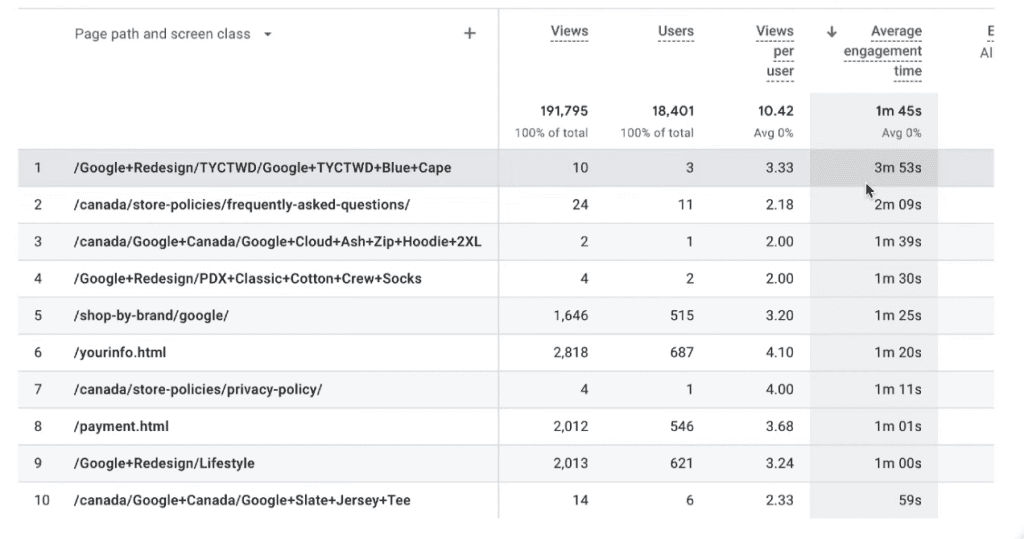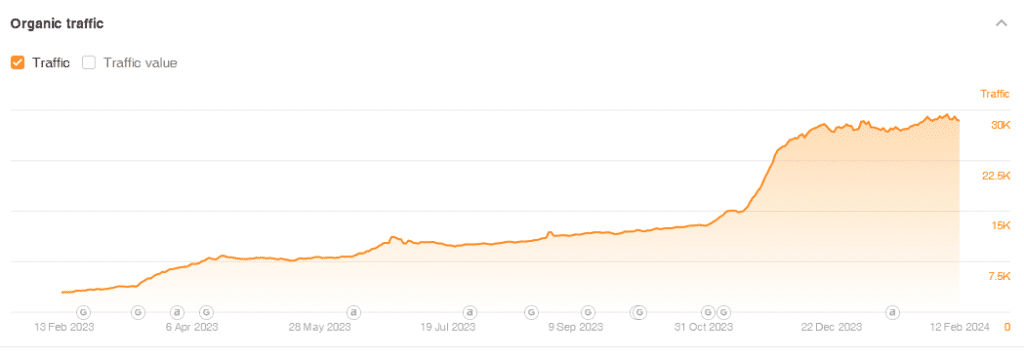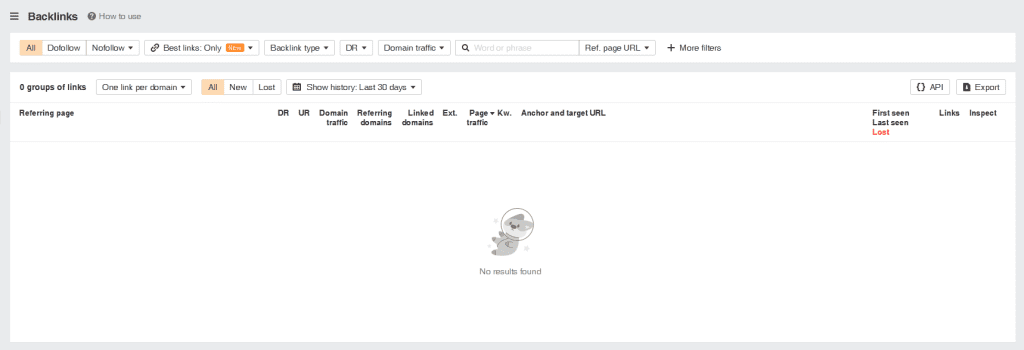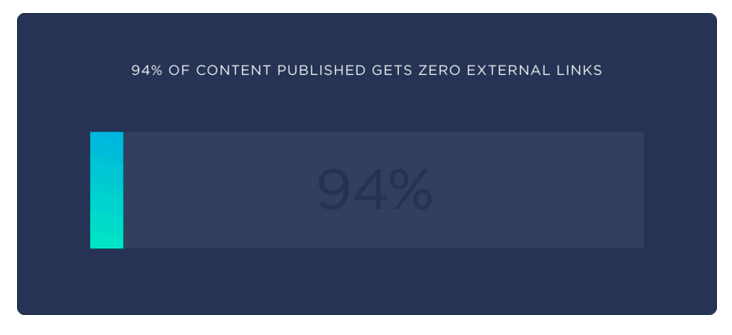You’ve just poured hours into perfecting your website’s content. You carefully wove in keywords and craft messages that resonate with your readers. Yet, despite your efforts, the traffic graph is flatlining.
Your site isn’t climbing the search engine ranks as you hoped, and your audience seems just out of reach. This is the frustration many webmasters face.
But why?
SEO success requires two critical pieces: content and backlinks. We’re asked repeatedly in our Facebook Group and YouTube channel, which is more important.
Search engine talking heads and their advocates preach that exceptional content is your golden ticket to the first page rankings.
Other black and gray hat SEOs insist that without a good backlink strategy, even the best content won’t be found.
When building backlinks at SirLinksalot, we’ve observed firsthand the varying impacts of backlinks on our clients’ sites. Some have seen significant ranking improvements after the first month of link building, while others have shown no noticeable change despite receiving dozens of links.
This disparity asks for a deeper exploration. What truly drives SEO success – the content you create or the backlinks that endorse your site’s quality?
Key Takeaways
- Quality content and backlinks are essential in SEO. They are complementary forces, not competitors, for your focus.
- Content serves as the foundation of SEO by engaging your audience and providing value to readers.
- Backlinks act as digital endorsements, boosting your site’s visibility and credibility.
- A diverse and relevant link profile from various authoritative sources enhances your website’s trustworthiness. It can also make the site less vulnerable to algorithm updates.
- Balancing quality content creation with a robust backlink strategy ensures optimal website performance in SERPs.
The Significance of Content
Quality content is the bedrock of SEO, and understanding its importance is the first step to online visibility.
Even though we sell backlinks as a service, we always have to recommend our clients to not neglect the content on their site.
Content is not just the random mix of words on your web page. The quality content delivers the message you convey, the value you offer, and the connection you establish with your audience.
Various types of content cater to different preferences within your target audiences, allowing you to effectively engage with their customers across multiple platforms and formats:
- Blog Posts and Articles
- White Papers, eBooks, and Reports
- Podcasts
- Email Newsletters
- Images
- Videos
- Infographics
- Social Media Content
- Templates & Checklists
- Guides & How-Tos:
- User-Generated Content
All of these types of content can help engage your readers and be beneficial to your SEO.
Why Quality Content Is the Foundation of SEO
Quality content is like the magnetic force that keeps your visitors on your page. It provides information that is not just good but exceptional.
This type of content is relevant, informative, and engaging. It keeps your audience hooked and encourages them to explore more.
Quality content is beneficial to your rankings. When search engines crawl your site, they’re looking for content that’s valuable to users. Helpful content provides unique opinions and is not already widely available on the internet.
Especially with the recent Google algorithm updates, we highly suggest focusing on quality content that fulfills Google’s Helpful Content Guidelines. Not only will it help you rank, it will also keep your site safe from penalties.
How Content Affects Search Engine Rankings and User Engagement
Search engines are in the business of providing users with the best possible experience (we can put driving ad revenue aside for a moment). Content is a vital component of that experience.
When your content is valuable and relevant, it ranks higher and keeps visitors engaged. Engaged users spend more time on your site, click through various pages, and are more likely to convert into customers.
We’ve worked on numerous link building campaigns where we’ve built amazing backlinks, but the sites’ content was not relevant enough or engaging.
This created bad user signals and resulted in smaller ranking increases than we should have seen with the amount of backlinks built.

The Role Of Keywords, Content Formats, and Relevant Content In SEO
Every SEO project we work on begins with the proper use of keywords and relevance in our content.
Keywords help search engines understand your content. Quality content incorporates these keywords seamlessly. This makes it easier for search engines to find and index your pages.
Different content formats, such as blog posts, videos, and images, cater to the diverse preferences of your audience. They help capture and retain user attention.
Relevance is the secret ingredient that keeps visitors coming back. When your content directly addresses the needs and interests of your audience, it becomes a valuable resource.
This not only boosts your credibility but also encourages others to link to your content, further enhancing your SEO performance.
The Power of Backlinks
Backlinks, often dubbed as the secret sauce of SEO by our clients, are extremely powerful for SEO.
We think they are roughly 50% of the ranking equation based on years of building links and content sites.
They are the digital endorsements, vouching for the quality and credibility of your website.
Anyone can write content, but not everyone can get digital endorsements from third parties.

Backlinks and Their Impact on SEO
Backlinks, or inbound links, are links from other websites pointing to your own. They act as votes of confidence.
When another website links to yours, it’s a signal that your content is worth sharing. Search engines, like Google, interpret these backlinks as a vote of confidence and trust.
The more high-quality backlinks your website has, the more authoritative it appears to search engines, which can positively impact your SEO rankings.
When we start building links for websites that don’t have many yet, we often see SEO results extremely quickly, as that was all that was missing for Google to trust their quality content.
Diversity plays a pivotal role in the world of backlinks. A diverse and relevant link profile presents a well-rounded and trustworthy image to search engines. It includes different types of links from various sources.
At SirLinksalot, we use different links for different jobs. For example, you wouldn’t want to use high authority links to diversify an anchor profile as it’s highly cost-inefficient.
There are several types of links that move the needle:
- Guest posts
- Niche edits
- Pillow links
- Diversity links
- Citations
- Social signals
- Social profiles
- PBN links
- Press releases
Each link type has a slightly different purpose, but all contribute towards a diversified backlink profile, and we like using them all as part of our link building campaigns.
The Importance of Backlinks From Authoritative Sources
Not all backlinks are created equal. High-quality backlinks from authoritative and trustworthy sources hold more weight.
When we audit our client’s websites off-page SEO, one thing sets apart low-performing websites. They lack contextual backlinks from sites with decent metrics and traffic.
These could be things like quality guest posts, niche edits, HARO, or other editorial-style links.

These sources are usually well-established websites with a solid reputation. When these authoritative websites link to your content, it’s like a gold stamp of approval.
It boosts your credibility and tells search engines that your content is of high value.
Dofollow And Nofollow Backlinks
Dofollow and nofollow backlinks are distinctions that tell search engines how to treat the links. Dofollow links pass on “link juice,” which can positively impact your website’s SEO. We see many SEOs and clients that strictly want dofollow links for this reason.
The nofollow tag, on the other hand, suggests search engines not pass on link juice. They are often used for user-generated content, like comments on blogs, to prevent spam.
While nofollow links may not boost your SEO as strongly as dofollow links, they can still direct traffic to your website, which is valuable in its own right.
We think that nofollow links can still pass link juice, even though Google says the opposite. So while we do prefer dofollow links to help increase rankings, all our experience shows that quality nofollow links can be hugely beneficial to your rankings.
The Content vs Backlinks Debate
Should you prioritize content or backlinks in your SEO strategy?
The debate over content versus backlinks has been an ongoing saga in the SEO world.
To this day, we get asked which is more important at least once a week by members of our Facebook Group or viewers on our YouTube channel.
Some people swear by the importance of creating high-quality content. They say it’s the starting point for a successful SEO strategy.
Others argue that building a robust backlink profile is the key to unlocking the gates to higher search engine rankings.
Content-First Or Backlinks-First
The ‘content-first’ proponents argue that high-quality content is the linchpin of SEO success. Their reasoning is that great content naturally attracts backlinks.
When you create valuable content that addresses user needs and offers unique insights, it becomes a magnet for backlinks.
After all, why would others link to your content if it doesn’t provide value? In this perspective, content takes the lead, and backlinks follow.
We definitely see value in this approach, and we agree that even if you are building backlinks, you should also focus on quality content for ranking as well as attracting free backlinks.
The ‘backlinks-first’ advocates contend that building a strong backlink profile should be the primary focus. They argue that even exceptional content won’t gain traction without the necessary backlinks. According to this camp, the more high-quality backlinks you secure, the better your content will perform.
This opinion is supported by a study by Backlinko in 2019 that revealed that 94% of all blog posts have zero external links. This means that building links can give you an edge over 94% of the internet.

Source: https://backlinko.com/content-study
At the end of the line, we believe that both content quality and backlinks are necessary to achieve high rankings. All of our most successful link building campaigns have had quality content to link to and create good user signals.
If your content is high quality but lacks backlinks, search engines will see it as less authoritative. This is because it’s not vouched for by authority websites.
On the other hand, if you have lots of links but the quality is underwhelming, users won’t spend much time on your website. This may signal to search engines that the content quality is lacking.
Conclusion
You can think of content and backlinks as the front and rear wheels of a bicycle.
Just as both wheels are crucial for the bicycle to move forward efficiently (or move forward at all), content and backlinks play an important role in ranking on Google.
Quality content acts like the front wheel, steering your SEO strategy in the right direction by engaging and informing your audience. Backlinks, the rear wheel, provide the necessary momentum, boosting your site’s visibility and credibility through endorsements from other websites.
Together, they form a balanced and powerful combination.
The synergy between content and backlinks is the key to a smooth and successful SEO journey. It’s like a well-maintained bicycle gliding effortlessly on its path.
We are a link building agency, so it would be great if we could tell you that all you need is backlinks to rank. It would be great for business.
But that’s not the case.
Invest in both content and backlinks and thank us later!

